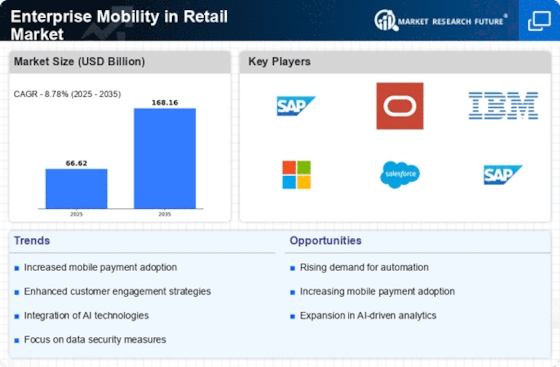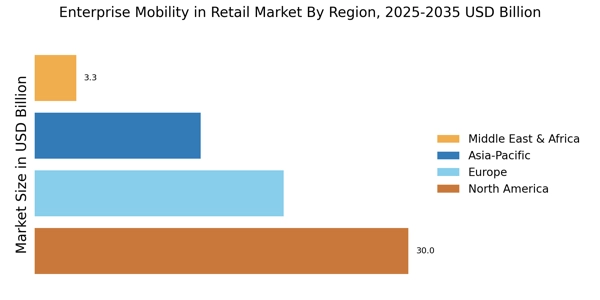Enhanced Customer Engagement
The Enterprise Mobility in Retail Market is witnessing a notable shift towards enhanced customer engagement strategies. Retailers are increasingly leveraging mobile applications to create personalized shopping experiences. This trend is supported by data indicating that 70% of consumers prefer to engage with brands through mobile devices. By utilizing mobile platforms, retailers can offer tailored promotions, loyalty programs, and real-time customer support, thereby fostering a deeper connection with their clientele. Furthermore, the integration of mobile technologies allows retailers to gather valuable insights into consumer behavior, enabling them to refine their marketing strategies. As a result, the emphasis on customer engagement through mobile solutions is likely to drive growth in the Enterprise Mobility in Retail Market.
Adoption of Cloud-Based Solutions
The adoption of cloud-based solutions is significantly influencing the Enterprise Mobility in Retail Market. Retailers are increasingly migrating their operations to the cloud to enhance scalability, flexibility, and accessibility. Cloud-based mobile applications allow retailers to manage their operations from anywhere, facilitating remote work and real-time data access. This shift is supported by data indicating that 60% of retailers plan to increase their investment in cloud technologies over the next few years. By leveraging cloud solutions, retailers can reduce IT costs and improve collaboration among teams. This trend not only enhances operational efficiency but also positions retailers to respond more effectively to changing market conditions, thereby driving growth in the Enterprise Mobility in Retail Market.
Focus on Enhanced Security Measures
The focus on enhanced security measures is becoming increasingly paramount in the Enterprise Mobility in Retail Market. As mobile solutions proliferate, retailers face heightened risks related to data breaches and cyber threats. Consequently, there is a growing emphasis on implementing robust security protocols to protect sensitive customer information. Recent statistics indicate that 43% of cyber attacks target small businesses, underscoring the need for retailers to prioritize security in their mobile strategies. By investing in advanced security technologies, such as encryption and multi-factor authentication, retailers can safeguard their operations and build consumer trust. This focus on security not only mitigates risks but also supports the overall growth of the Enterprise Mobility in Retail Market.
Operational Efficiency and Cost Reduction
In the Enterprise Mobility in Retail Market, operational efficiency and cost reduction are becoming increasingly critical. Retailers are adopting mobile solutions to streamline their operations, which can lead to significant cost savings. For instance, mobile inventory management systems enable real-time tracking of stock levels, reducing the likelihood of overstocking or stockouts. According to recent studies, businesses that implement mobile solutions can reduce operational costs by up to 30%. Additionally, mobile point-of-sale systems facilitate faster transactions, enhancing the overall customer experience. This operational agility not only improves service delivery but also contributes to a more efficient supply chain, positioning retailers to respond swiftly to market demands.
Rise of E-commerce and Omnichannel Strategies
The rise of e-commerce and omnichannel strategies is a pivotal driver in the Enterprise Mobility in Retail Market. As consumers increasingly prefer shopping across multiple channels, retailers are compelled to adopt mobile solutions that support seamless integration between online and offline experiences. Data suggests that omnichannel customers spend 30% more than single-channel customers, highlighting the financial incentive for retailers to invest in mobile technologies. By providing a cohesive shopping experience through mobile apps, retailers can enhance customer satisfaction and loyalty. This trend underscores the necessity for retailers to embrace mobility as a core component of their business strategy, thereby driving growth in the Enterprise Mobility in Retail Market.
















